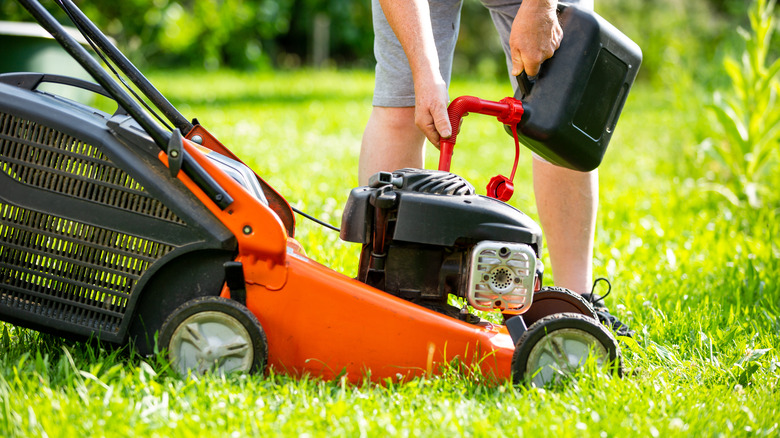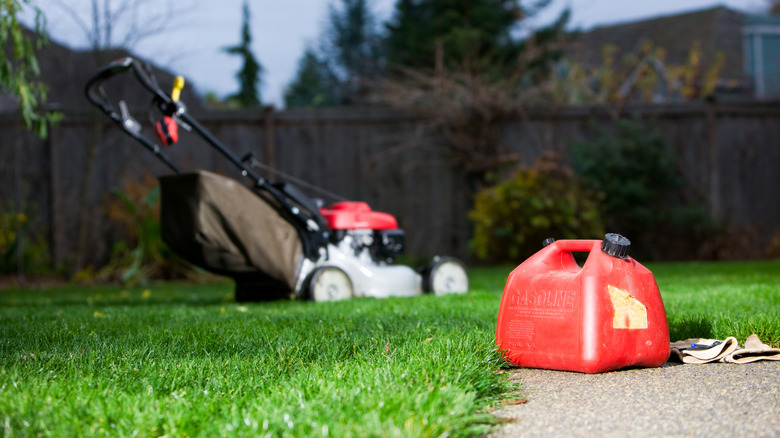How Often Should You Be Changing The Gas In Your Lawn Mower
Your lawn mower is a reliable workhorse that brings order to your yard. However, your mower's dependability isn't a given, and the machine demands your attentive care. Among the many elements that help the machine function correctly, the gasoline a mower uses often doesn't get the limelight it deserves. Yet, it's the lifeblood of the machine, powering it through countless hours of service. For this reason, managing the gas is one of the most critical aspects of this maintenance. How often the gas should be changed may depend on the model of the mower, but experts recommend changing it once every season, once every 30 days, or every 50 hours after being used.
Remember, a happy lawn mower means a happy lawn, and a healthy lawn is the result of diligent, attentive care. That includes ensuring that your mower's gas is as fresh as the grass it tends. It's a small task, but its impact on your mower's performance and longevity is tremendous. Here, we'll explain in more detail why you should change the gas in your lawn mower regularly and the importance of this seemingly trivial task.
When to change your lawn mower's gas
Your lawn mower isn't a daily driver. It likely spends more time in hibernation in your garden shed than it does grooming your yard. Because of this periodic usage, the gas in its tank tends to sit for extended periods, and this is where problems begin to brew. Gasoline isn't designed to sit idle; it's a volatile mix that degrades over time. Typically, this degradation becomes significant over the span of three to six months in some machinery. Yet, within the confines of your lawn mower, this process accelerates, transforming your premium fuel into a sticky, varnish-like substance within just 30 days.
So, if your lawn mower has been taking a well-deserved break for over a month, it's time to change its gas. It's best practice to kick-start each mowing season with a tank full of fresh fuel. This simple habit can make a world of difference to the health and performance of your machine, ensuring that it's primed and ready to give your lawn the manicured look it deserves. Apart from maintaining freshness, using the right fuel for your mower is equally important. Not all fuels are created equal. Some have a higher ethanol content, which can harm your lawn mower's engine. It's always best to refer to your mower's manual to determine the right type of gas. Most often, regular unleaded gasoline with an ethanol content of up to 10% (E10) is a safe bet for most lawnmowers.
The importance of regular gas change
Regularly changing the gas in your lawn mower is important to prevent your machinefrom malfunctioning. At times, you might have found yourself wrestling with a stubborn lawnmower that refuses to start. Surprisingly, the culprit behind this inconvenience often lies in the unassuming act of oxidation. When gasoline remains stagnant for prolonged periods, it reacts with the oxygen present in the air. This interaction spawns gums and varnishes — sticky substances that are the bane of any fuel system. These by-products infamously clog fuel lines, gum up carburetors, and create chaos within your mower's fuel system. As a result, your mower's engine, reliant on this fuel system, can't function optimally, explaining its occasional rebellion against starting up.
Furthermore, regularly changing your mower's gas wards off the specter of excessive repair or replacement costs. As the gas ages, it doesn't just lose its effectiveness; it turns into a corrosive agent. Stale gas can gnaw at the internal components of your mower's engine, inflicting considerable damage. Neglecting this maintenance task could lead to a damaging domino effect, leading you down a path of pricey repairs or, even worse, the need for a total replacement. By committing to the simple practice of ensuring that your mower is always fueled by fresh gas, you do more than maintain its functionality. You breathe life into your mower, prolonging its lifespan and guaranteeing the health and beauty of your lawn. Indeed, regular gas changes are a small price to pay for years of dependable service from your mower.


